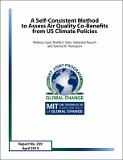| dc.contributor.author | Saari, Rebecca Kaarina | |
| dc.contributor.author | Selin, Noelle E. | |
| dc.contributor.author | Rausch, Sebastian | |
| dc.contributor.author | Thompson, Tammy M. | |
| dc.date.accessioned | 2016-08-25T18:05:37Z | |
| dc.date.available | 2016-08-25T18:05:37Z | |
| dc.date.issued | 2014-10 | |
| dc.date.submitted | 2014-05 | |
| dc.identifier.issn | 1096-2247 | |
| dc.identifier.issn | 2162-2906 | |
| dc.identifier.uri | http://hdl.handle.net/1721.1/103986 | |
| dc.description.abstract | Air quality co-benefits can potentially reduce the costs of greenhouse gas mitigation. However, whereas many studies of the cost of greenhouse gas mitigation model the macroeconomic welfare impacts of mitigation, most studies of air quality co-benefits do not. We employ a U.S. computable general equilibrium economic model previously linked to an air quality modeling system and enhance it to represent the economy-wide welfare impacts of fine particulate matter. We present a first application of this method to explore the efficiency and distributional implications of a Clean Energy Standard (CES) and a Cap and Trade (CAT) program that both reduce CO[subscript 2] emissions by 10% in 2030 relative to 2006. We find that co-benefits from fine particulate matter reduction (median $6; $2 to $10/tCO[subscript 2]) completely offset policy costs by 110% (40% to 190%), transforming the net welfare impact of the CAT into a gain of $1 (−$5 to $7) billion 2005$. For the CES, the corresponding co-benefit (median $8; $3 to $14/tCO[subscript 2]) is a smaller fraction (median 5%; 2% to 9%) of its higher policy cost. The eastern United States garners 78% and 71% of co-benefits for the CES and CAT, respectively. By representing the effects of pollution-related morbidities and mortalities as an impact to labor and the demand for health services, we find that the welfare impact per unit of reduced pollution varies by region. These interregional differences can enhance the preference of some regions, such as Texas, for a CAT over a CES, or switch the calculation of which policy yields higher co-benefits, compared with an approach that uses one valuation for all regions. This framework could be applied to quantify consistent air quality impacts of other pricing instruments, subnational trading programs, or green tax swaps. | en_US |
| dc.description.sponsorship | United States. Environmental Protection Agency (Science to Achieve Results (STAR) program (no. R834279)) | en_US |
| dc.description.sponsorship | Massachusetts Institute of Technology (Leading Technology Policy Initiative (LTP)) | en_US |
| dc.description.sponsorship | United States. Dept. of Energy. Office of Basic Energy Sciences (grant DE-FG02-94ER61937) | en_US |
| dc.description.sponsorship | Massachusetts Institute of Technology (Martin Family Society Fellowship) | en_US |
| dc.description.sponsorship | Massachusetts Institute of Technology. Joint Program on the Science & Policy of Global Change | en_US |
| dc.language.iso | en_US | |
| dc.publisher | Taylor & Francis | en_US |
| dc.relation.isversionof | http://dx.doi.org/10.1080/10962247.2014.959139 | en_US |
| dc.rights | Creative Commons Attribution-Noncommercial-Share Alike | en_US |
| dc.rights.uri | http://creativecommons.org/licenses/by-nc-sa/4.0/ | en_US |
| dc.source | MIT web domain | en_US |
| dc.title | A self-consistent method to assess air quality co-benefits from U.S. climate policies | en_US |
| dc.type | Article | en_US |
| dc.identifier.citation | Saari, Rebecca K., Noelle E. Selin, Sebastian Rausch, and Tammy M. Thompson. “A Self-Consistent Method to Assess Air Quality Co-Benefits from U.S. Climate Policies.” Journal of the Air & Waste Management Association 65, no. 1 (December 20, 2014): 74–89. | en_US |
| dc.contributor.department | Massachusetts Institute of Technology. Center for Global Change Science | en_US |
| dc.contributor.department | Massachusetts Institute of Technology. Engineering Systems Division | en_US |
| dc.contributor.mitauthor | Saari, Rebecca Kaarina | en_US |
| dc.contributor.mitauthor | Selin, Noelle E. | en_US |
| dc.relation.journal | Journal of the Air & Waste Management Association | en_US |
| dc.eprint.version | Original manuscript | en_US |
| dc.type.uri | http://purl.org/eprint/type/JournalArticle | en_US |
| eprint.status | http://purl.org/eprint/status/NonPeerReviewed | en_US |
| dspace.embargo.terms | N | en_US |
| dc.identifier.orcid | https://orcid.org/0000-0002-6396-5622 | |
| mit.license | OPEN_ACCESS_POLICY | en_US |
